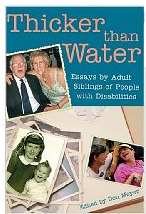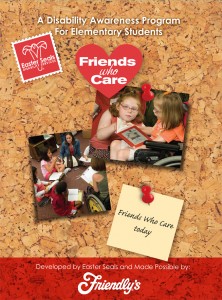by Kathy Patrick
I’m the vice president of services for Easter Seals New Jersey, so I was invited to attend the Legislative Summit of the National Conference of State Legislatures in Philadelphia earlier this month.
Along with other Easter Seals affiliate and national staff members who handle state government relations, I networked with state legislators, learned about the issues facing my state legislators, and educated legislators and their staff on issues facing Easter Seals.
I also wear the “autism spokesperson” hat for Easter Seals New Jersey, so I participated in a session for legislators called Autism Spectrum Disorders: State and Federal Policy Trends. The session was sponsored jointly by Easter Seals and the Association of University Centers on Disabilities (AUCD).
Our session began with George Jesien, executive director of AUCD, and Jennifer Bogin, project manager for AUCD, who discussed research, education and services for individuals with ASD. They were followed by Denise Rozell, assistant vice president for state government relations for Easter Seals. Denise detailed what’s new with state legislators and encouraged them to link to our 2009 State Autism Profiles. The profiles provide factual, objective descriptions of what the 50 states, D.C. and Puerto Rico are doing for people with autism.
After Denise, Pennsylvania Representative Dennis O’Brien and Maryland Representative Kirill Reznik captivated the audience with stories of how they advocate for people with autism. And then it was our turn: Charlie Briggs, assistant vice president of adult and community services for Easter Seals Goodwill Northern Rocky Mountain and I were prepared to discuss our state’s accomplishments and share some personal stories. The reason I say “were prepared” is that the session ran long. By the time Charlie and I were supposed to speak, attending legislators and their staff needed to get on their way to the next event. Bill Gates was presenting immediately following our session! And while fans of Charlie and me would agree that we are two of the most engaging and amazing speakers, we recognized that we are not the great Gates. We let our fans move on.
What I had wanted to share with the audience was my viewpoint as a parent of a child with ASD — to help them understand why all of this matters. Two of the speakers had discussed “the cliff,” the feeling that many families experience when their child with autism turns 21 and the scope of services changes dramatically (for the worse).
My son is only 12 so I haven’t seen that particular cliff yet. But trust me, I’ve had many hair-raising experiences already with other cliffs. I’ve been on the edge, frustrated by the lack of available services my son desperately needed. That feeling is something you never forget. You want to give up and jump off. And, sometimes, you want to push someone else off with you while you’re at it!
I’m a resourceful person with a graduate degree in special education. I have a lifetime worth of contacts and experiences with supporting people with disabilities. I’m a blessed person surrounded by friends, family and colleagues who would all do whatever was necessary to help my son and me. I have a roof, a job and health insurance. But I still couldn’t find the services that would meet my son’s needs. If I can stand on the edge of that cliff and consider how much easier it would be to give up, one can only imagine what it’s like to be in a more challenging situation.
Whether you are a legislator, a friend, a supporter, a fan, a family member, or someone with ASD, you can’t ever give up. You can’t let the cliff get the best of you. Resisting the urge to jump can make you stronger. Let the cliff make the best of you, use your strength to give it all you have — ensure that people with ASD all over this country get the services they need. If we work together, maybe fewer people will end up living on the edge.








